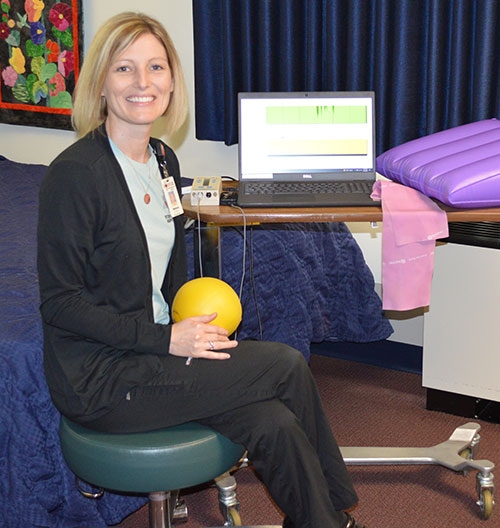You are here
Home ›April is National Occupational Therapy Month; Pelvic Floor Rehabilitation at VMH is effective

Pelvic Floor Rehabilitation at VMH ... April is Occupational Therapy Month. Pictured is Melissa Clarke, Occupational Therapist at Veterans Memorial Hospital. Over 11 years ago she introduced the bladder and bowel incontinence treatment program at the hospital and has seen very positive results. This program is one of many specialties offered by the Occupational Therapy Department at Veterans Memorial Hospital in Waukon. Submitted photo.
The Occupational Therapy Department at Veterans Memorial Hospital has had a pelvic floor rehabilitation program for over 11 years. Staff member Melissa Clarke, Occupational Therapist, has been providing this treatment and has seen very positive results.
More people than one may think are impacted by bladder and bowel dysfunction. On average, 25-30% of adults 25-55 years old have experienced bowel or bladder problems. An average of 35-40% of individuals over 65 who live in the community have bladder and bowel problems, and 10-15% of children 8-16 years old have nighttime wetting. The good news is 61% of people using the Beyond Kegels program were dry in three-and-a-half weeks.
“Many adults are told to do kegel exercises for their incontinence, however are not properly taught how to complete them. With this program we utilize more than just kegel exercises,” states Melissa Clarke, O.T. “I instruct patients in different lifestyle changes and exercises that have been shown to be more effective than kegels alone. A few components of the program include lifestyle and nutrition changes, physiological quieting, pelvic floor exercises, biofeedback, and instruction in a home exercise program.”
People who can benefit from pelvic floor rehabilitation include women, men, elderly adults, children, and pregnant/postpartum women with bladder and bowel dysfunction or pelvic organ prolapse. Not only has this program proven to decrease urine and bowel leaking, but also frequency and urgency of urination. This program has also improved pelvic organ prolapse in women.
“The pelvic floor muscles are delicate bowl-shaped muscles that hold the bowel and bladder. Dysfunction occurs not only because of weakness, but also because of an imbalance in the pelvic muscles,” adds Clarke. “This imbalance can be seen through the use of our computerized biofeedback tool. This tool allows us and our patients to see their own pelvic muscle activity on a computer screen, then together we can begin the treatment for correction.”
The following is an anonymous testimony from a recent patient who has utilized this special training with great success:
“Bladder control really isn’t anything people talk about. As an older lady, I have much less urgency during the day and feel comfortable going places now after doing these exercises. I make many fewer trips to the bathroom during the night and I am getting better sleep now.
“I like being able to do the exercises at home so I am in control of when I want to do them. I really don’t have an actual routine, I just try to work it in whenever I need a rest from something. It’s a good chance to sit down and do them. It’s pretty simple to get it worked into your day, especially with the great success they bring.
“How blessed we are to have these specialized services locally. It is wonderful to see so many of our young people who went away and got training, bring their skills back to our community to share with all of us, allowing us all to reap the benefits of their education! Melissa is a wonderful example of that. She is so knowledgeable about the bladder and control problems. You can tell she has really dug deep to find the information people need and is very accommodating with her schedule to work us in.
“Some people have told me they wouldn’t be able to do these exercises the rest of their life, but you just take it one day at a time. I hope people will give it a try. If it helps anyone as well as it has helped me, it is certainly worth it.” ~ Anonymous
Any bladder or bowel activity that results in lifestyle alterations, emotional changes or feelings of discomfort is a problem. By identifying specific impairments and the severity, the Veterans Memorial Hospital Occupational Therapy Department can assist with finding a solution.
Anyone who is suffering from pelvic health concerns such as bladder and bowel dysfunction or pelvic organ prolapse should visit their doctor to see if this local program may be beneficial. For more information, call the Veterans Memorial Hospital Rehabilitation Department at 563-568-3411.

